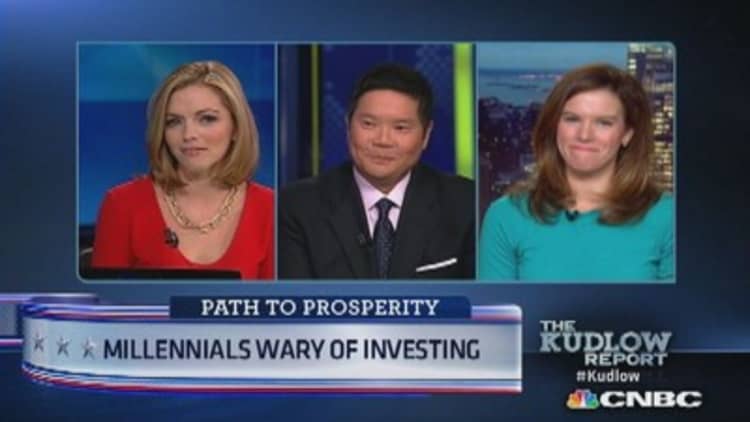What makes a millennial tick?
Much ink has been spilled trying to answer that question, and the conclusion is often that people born between the early 1980s and the late 1990s are entitled and self-involved, and less than ideal employees.
But according to some surveys, millennials may have more in common with older Americans than you think.
Take investing.
According to a new UBS survey on investor behavior, millennials—which it refers to as Next Gen—are "extremely conservative, savers not investors and not nearly as self-directed as one would expect."
(Read more: Broke millennials may want to check out this app)
Twenty-somethings said the best financial advice they received was about the value of saving, in contrast to members of Gen X, who cited investing as the most valuable. Millennials also keep cash on hand, as boomers do.
"The Next Gen investor is markedly conservative, more like the WWII generation who came of age during the Great Depression and are in retirement," UBS said.

Another study, by the human resources company Randstad, found that both millennials and boomers enjoy their jobs more than workers in other age groups. Some 89 percent of what Randstad called "mature workers" and 75 percent of millennials said they like going to work, and strong majorities felt energized about giving it their all.
But millennials have certain expectations about their careers and about corporate responsibility that mark a departure. They also seem to be less cautious than boomers and more selective about where they work, but not all the news is discouraging.
A survey conducted last year by the National Society of High School Scholars of 9,000 students ages 15 to 27 found respondents most interested in so-called STEM careers (science, technology, engineering or mathematics.)
(Read more: Gen Y managers perceived as entitled, needing polish)
Hospitals and health-care companies accounted for a third of the respondents' top 25 potential employers, with St. Jude Children's Research Hospital, Disney and "local hospital" occupying the top three spots. (The highest-ranked financial services company, JPMorgan Chase, was No. 37 on the list.)
Members of the cohort also have lofty expectations for the workplace.
"They ranked fair treatment, corporate social responsibility and benefits the highest," the survey found.
A new study from Deloitte also found differences in workplace attitudes between millennials and older generations, saying that the former "want to work for organizations that foster innovative thinking, develop their skills and make a positive contribution to society."
Gary Coleman, managing director of global industries at Deloitte, said, "They are just looking for a more innovative type of company that has more innovative ways of getting things done."
(Read more: Homeownership: Elusive American dream for millennials)
Coleman, who identifies as a baby boomer, said most of his business interactions are with boomers.
Clients would say that the biggest change in attitude with millennials "is paying more attention to social issues, being more discretionary about who they work for," he said. "The fear of failure is very different in millennials compared to baby boomers."
Employers that think ahead can respond to the group's priorities, Coleman said. Those embracing digital technologies—both in how work gets done, and in creating and selling products—have a leg up in attracting millennials. Offering leadership opportunities and focusing on culture and values also helps.
(Read more: The reason college grads can't find work)
"Millennials are going to make up something on the order of 75 percent of the workforce in 10 years," he said. "That's a group that you've got to listen to."
—By CNBC's Kelley Holland. Follow her on Twitter @KKelleyHolland.


